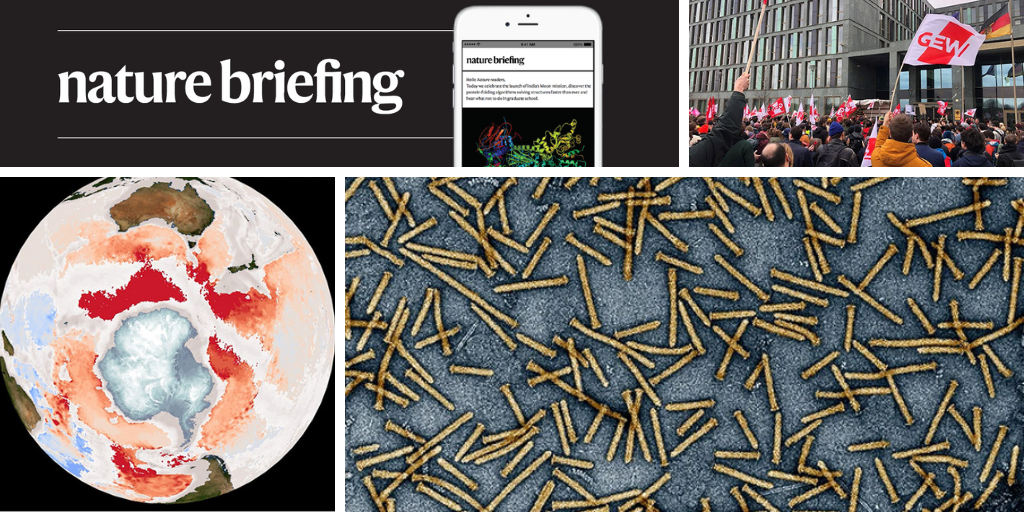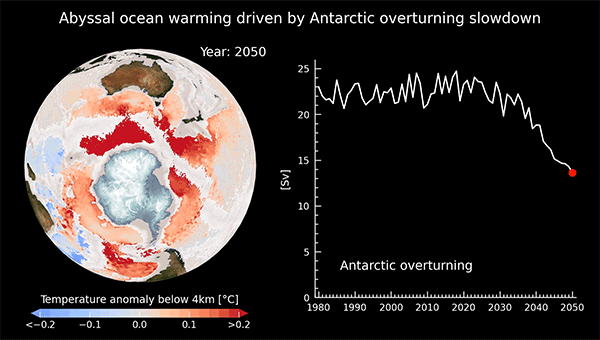Hello Nature readers, would you like to get this Briefing in your inbox free every day? Sign up here
Warming in the abyssal ocean — water from 3,000 to 6,500 metres deep —, could cause the Antarctic overturning circulation to decline by more than 40% by 2050. (Matthew England and Qian Li)
There are worrying signs that torrents of fresh water melting off Antarctica are disrupting the flows of cold, salty, oxygen-rich water that drive crucial deep-ocean currents. These powerful currents store and transport huge amounts of heat and carbon around the world, and support marine life by churning nutrient-rich water from the depths to the surface. A slowdown in this ‘overturning circulation’ could drive further melting and shift rainfall patterns around the globe.
The Straits Times | 4 min read
Researchers have repurposed a bacterium’s molecular ‘syringe’ to deliver proteins, such as the genome-editing Cas9 or a cancer-killing toxin, into human cells or the brains of mice. The bacterium Photorhabdus asymbiotica’s injection system usually works only on insect cells. The team modified the structure of the system so that it would recognize other species’ cells and accept payloads including the Cas9 protein, which is five times larger than the syringe’s usual cargo. The method could be a way to administer protein-based drugs and address one of gene editing’s major bottlenecks: delivering the CRISPR–Cas9 system to where it’s needed.
Following the release of a report on data relating to the origin of the COVID-19 pandemic, the genome hub GISAID briefly revoked — and then reinstated — the report authors’ access to the online database. GISAID said that the report authors had not done enough to protect the interests of the Chinese team that had generated the data the report was based on. The report authors deny this. The incident, which GISAID is still investigating, has sparked a debate over how and when researchers should disseminate findings based on data found in online repositories.
Scientists can recover up to 70% of the lithium inside a battery by grinding up the cathode with aluminium foil. Unlike commercial processes, this one doesn’t need high temperatures or concentrated acids. Mechanical force during milling kicks off a chemical reaction, although how exactly this mechanochemistry works is unclear. Currently, perhaps 15% of the metal in batteries is recovered. The European Union, for example, has set a target of recovering 80% of the lithium in batteries by 2031. The mechanochemical recycling process is a proof of principle rather than a game-changing technology, cautions lithium-battery consultant Hans Eric Melin.
Reference: Communications Chemistry paper
Hundreds of researchers gathered in front of the German research ministry in Berlin last week to demand improvements to working conditions in academia. The protest is the latest flashpoint in a long-running debate about a law that means postdocs can be employed on fixed-term contracts for no longer than six years after they complete their PhD. The protest was part of a backlash against a ministry proposal — since withdrawn — to reduce the limit to three years. Those who can’t secure permanent jobs in time might be forced to leave academia or pursue research careers in other countries.
Features & opinion
Urban researcher Carlos Moreno’s ‘15-minute city’ concept, in which amenities such as shops and parks are accessible with a short walk or cycle ride, has become popular among city planners. It also made him a target of climate-change deniers and QAnon conspiracy theorists, who misrepresented the idea as part of a global plot to control people’s movements. With more scientists being subject to online harassment and disinformation, Moreno notes that many “are relatively alone” and unsupported in how to deal with it. “It is totally unbelievable that we could receive a death threat just for working as scientists,” he says.
The New York Times | 6 min read
Read more: ‘I hope you die’: how the COVID pandemic unleashed attacks on scientists (Nature | 14 min read, from 2021)
In the 1950s and 1960s, scientists tracked immune cells called lymphocytes — which include T cells and B cells — on their journey around the body, working out where they go and what they do. The work laid the foundation for everything we know about T cells today, including how they become activated to fight infections and how they form memory populations that provide long-lasting immunity.
Read more: Explore and celebrate pivotal studies that advanced our understanding of T cells (Nature Milestone | 9 min read, including several delightful videos)
Today I’m pondering how to transcribe bird sounds, whether by phonetic alphabet or spectrogram. My favourite is ‘warblish’, in which avian vocalizations are imitated using existing human words. Check out The Cornell Lab’s fabulous bird database to confirm that the olive-sided flycatcher (Contopus cooperi) does indeed whistle, “quick, three beers!”
While I attempt to coo-sy up to the local pigeons, why not send me your feedback on this newsletter? Your e-mails are always welcome at [email protected].
Thanks for reading,
Flora Graham, senior editor, Nature Briefing
With contributions by Katrina Krämer and Dyani Lewis
We’ve recently launched two new e-mails you might like. They’re free, and of course you can unsubscribe at any time.
• Nature Briefing: Cancer — a new weekly newsletter written with cancer researchers in mind. Sign up here to receive the next one.
• Nature Briefing: Translational Research covers biotechnology, drug discovery and pharma. Sign up here to get it free in your inbox each week.








More News
Judge dismisses superconductivity physicist’s lawsuit against university
Future of Humanity Institute shuts: what’s next for ‘deep future’ research?
Star Formation Shut Down by Multiphase Gas Outflow in a Galaxy at a Redshift of 2.45 – Nature